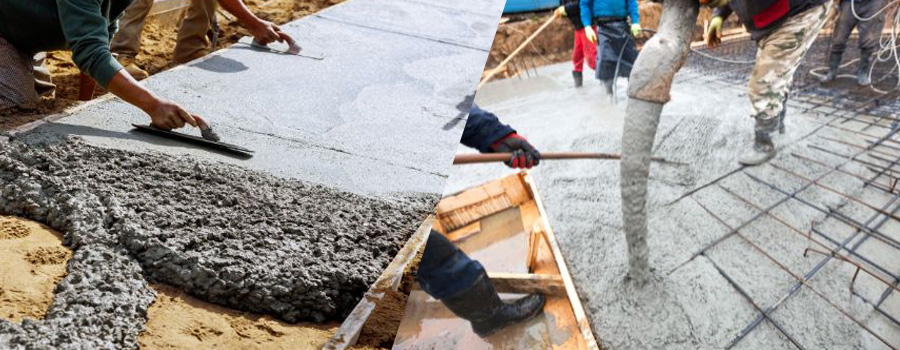Blog Post

Difference Between Ready Mix Concrete and On-Site Mix Concrete
Concrete is the lifeblood of the construction industry, serving as the foundation for buildings, roads, bridges, and countless other structures. When embarking on a construction project, one of the critical decisions contractors and builders face is choosing between ready-mix concrete and on-site mixed concrete. Both options have their merits, but they differ significantly in terms of convenience, quality, and cost-effectiveness. In this article, we'll explore the key distinctions between ready-mix concrete and on-site mixed concrete to help you make an informed choice for your construction needs.
Ingredients and Mixing Process: Ready Mix Concrete (RMC) is precisely manufactured in a controlled environment, typically at a batching plant. It consists of a predetermined mix of cement, aggregates (such as sand, gravel, and crushed stone), water, and often chemical admixtures. These components are measured, mixed, and transported to the construction site in specialized vehicles, ensuring a consistent quality mix. On the other hand, On-Site Mix Concrete involves mixing the ingredients on-site, which allows for more flexibility in terms of mix design adjustments and can be beneficial for projects with specific requirements.
Consistency and Quality: One of the significant advantages of RMC is its consistent quality. Since it is manufactured in a controlled environment, you can expect uniformity in terms of strength, durability, and workability. In contrast, on-site mixed concrete may vary in quality depending on factors like the skill of the workers, weather conditions, and equipment used. This variation can lead to inconsistencies in the final product, which may impact the structural integrity of the construction.
Time and Efficiency: RMC offers a time-saving advantage. The concrete is delivered to the construction site and is ready to use, reducing the time needed for mixing and preparation. This efficiency can significantly speed up construction projects, making it an attractive option for builders working under tight deadlines. In contrast, on-site mixed concrete requires time for preparation, mixing, and adjustment of the mix, which can slow down the construction process.
Cost Considerations: The cost of ready-mix concrete is typically higher than on-site mixed concrete. However, when considering the overall project costs, RMC can often be more cost-effective. This is because it minimizes waste, reduces labor requirements, and allows for more accurate cost estimation. On-site mixed concrete, while initially cheaper, can incur hidden costs due to factors like waste disposal, additional labor, and potential delays.
Waste Reduction: RMC is known for its minimal waste production. Precise measurement and mixing at the batching plant reduce the likelihood of excess concrete being discarded. On the other hand, on-site mixed concrete can lead to higher levels of waste, particularly if the mix isn't accurately calculated or if there are interruptions during the pouring process.
Environmental Impact: From an environmental perspective, ready-mix concrete tends to be more sustainable. The controlled batching process allows for better control over the use of raw materials and energy. Additionally, the reduced waste and efficient transportation contribute to a smaller carbon footprint. On-site mixed concrete, by contrast, can be less environmentally friendly due to the potential for material overuse and the transportation of raw materials to the site.
Customization: On-site mixed concrete offers more flexibility in terms of adjusting the mix to suit specific project requirements. This is particularly beneficial when dealing with complex construction projects or unique design specifications. RMC, while still adjustable to some extent, may not offer the same level of customization.
Conclusion
The choice between ready-mix concrete and on-site mixed concrete depends on various factors, including project size, schedule, budget, and specific requirements. Ready-mix concrete is the go-to option for larger projects with tight deadlines, as it offers consistent quality and time efficiency.
On the other hand, on-site mixed concrete is preferable for smaller projects with unique needs, where flexibility and customization are crucial. Ultimately, a well-informed decision will ensure the success of your construction project, whether you opt for the convenience of ready mix or the flexibility of on-site mixing.